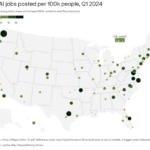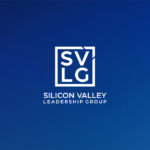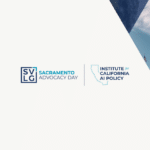Five core principles seek to inform AI’s responsible use as policymakers in Sacramento and beyond grapple with regulation amid AI revolution
San Jose, Calif. (November 2, 2023) – The Silicon Valley Leadership Group (SVLG) – the leading business association representing the innovation economy and its ecosystem – today released a new framework for the responsible use of Artificial Intelligence (AI) aimed at promoting trust in the transformative AI models and systems that have the potential to benefit people everywhere.
The framework was developed by SVLG’s Responsible AI Working Group, co-chaired by Google, in collaboration with member companies. It is meant to serve as a guide for the responsible deployment of AI technology in Silicon Valley and beyond. The framework includes five core principles – human-centered, explainable outcomes, equitable, secure, and risk-mitigation – that policymakers and tech companies should consider when designing new policies and technologies.
“SVLG is committed to bringing industry and government together to ensure the equitable and responsible deployment of AI technology that will drive our state’s economic competitiveness, starting right here in the Valley,” said Ahmad Thomas, CEO of SVLG. “We will continue to engage with policymakers and industry leaders to demystify and promote beneficial uses of AI using these five principles as our guide.”
The Working Group’s five core AI principles are:
- Human-centered. AI design and evolution should consider how humans will use and be impacted by the technology. AI should also be shaped with the objective of preserving human control as a final arbiter.
- Explainable outcomes. Explanations of AI system results should strive to be accurate and appropriate for the user. There should be a level of transparency so people know when AI is involved.
- Equitable. AI should avoid perpetuating or reinforcing unfair social or economic biases. Training data should be rigorous, as well as comprehensive, for its intended purpose. AI should be respectful of the cultural and social norms of the diverse communities in which it is used.
- Secure. AI systems should be secure from unauthorized access or use. The technology should prioritize preserving the confidentiality of sensitive information, and system security checks should happen at various levels (e.g., software, learning and distributed levels).
- Risk mitigation. The laws and regulations associated with AI systems should be balanced and weigh potential benefits against the challenges of different use cases.
“The responsible deployment of AI will require collaboration between policymakers, industry experts, and broader society to maximize benefits while mitigating potential pitfalls,” said Javier González, Google’s Head of Government Affairs, Public Policy, & External Relations for California. “We look forward to continuing to engage with Sacramento lawmakers, share our framework, and create an AI future that is safe, inclusive, and unlocks economic opportunities and benefits.”
Launched in May 2023, the SVLG’s Responsible AI Working Group develops resources to educate and inform the industry, public, and policymakers about the role of AI and how it is helping improve people’s lives and building a stronger business economy.
SVLG members or outside experts interested in engaging with this work should reach out to SVLG’s SVP and General Counsel Peter Leroe-Muñoz at pleroemunoz@svlg.org.
About the Silicon Valley Leadership Group:
The Silicon Valley Leadership Group (SVLG) is the leading business association representing the innovation economy and its ecosystem. Founded by David Packard of Hewlett-Packard, SVLG has worked for 45 years to address issues that affect the region’s economic health and quality of life. Today, SVLG Is focused on accelerating the next era of Silicon Valley leadership, activated by our three new Centers of Expertise (COE). Innovation & Technology, Sustainable Growth, and Inclusion & Belonging. SVLG members collectively provide nearly one of every three private sector jobs in Silicon Valley and contribute more than $3 trillion to the worldwide economy. For more information, visit svlg.org.
####




